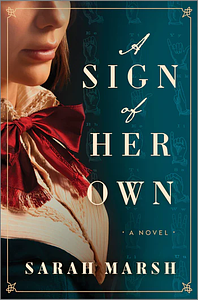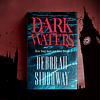You need to sign in or sign up before continuing.
Take a photo of a barcode or cover
challenging
dark
emotional
mysterious
reflective
sad
medium-paced
Plot or Character Driven:
Character
Strong character development:
Yes
Loveable characters:
Yes
Diverse cast of characters:
Yes
Flaws of characters a main focus:
Yes
informative
reflective
slow-paced
Plot or Character Driven:
A mix
Strong character development:
No
Loveable characters:
No
Diverse cast of characters:
No
Flaws of characters a main focus:
No
dark
mysterious
slow-paced
An extremely interesting concept but for me flawed by the novel's flow and construction.
I had no idea Alexander Graham Bell was involved with teaching deaf young people. I also found myself riveted by the differences between speech reading, which is only possible 40% of the time, and sign language,
Ellen Lark has been deaf since childhood and is happy in a school that practices sign language. She then gets sent to a school where Bell is her tutor. Here sign language is frowned on, and the only thing that matters is speech reading.
Ellen fancies she is close to Bell, and a party to his various inventions. The side plot around patents, conspiracies and the involvement of a deaf friend of Ellen's, Frank, is where the novel gets confusing. From the start we are in different timelines and exposed to characters in future confrontations with Ellen. I found myself scratching my head about who the different men were, and, early on, exactly why Ellen became resentful of Bell.
I persevered and liked the overall theme with Ellen and the deaf community being given a voice. But it could have been so much better.
I had no idea Alexander Graham Bell was involved with teaching deaf young people. I also found myself riveted by the differences between speech reading, which is only possible 40% of the time, and sign language,
Ellen Lark has been deaf since childhood and is happy in a school that practices sign language. She then gets sent to a school where Bell is her tutor. Here sign language is frowned on, and the only thing that matters is speech reading.
Ellen fancies she is close to Bell, and a party to his various inventions. The side plot around patents, conspiracies and the involvement of a deaf friend of Ellen's, Frank, is where the novel gets confusing. From the start we are in different timelines and exposed to characters in future confrontations with Ellen. I found myself scratching my head about who the different men were, and, early on, exactly why Ellen became resentful of Bell.
I persevered and liked the overall theme with Ellen and the deaf community being given a voice. But it could have been so much better.
'You miss nothing' Ellen Lark, the central character of this novel, is told, and yet there is definitely something missing from this book that leaves the reader slightly dissatisfied. Many times I tried to identify what it was that was missing from this book, until finally it occurred to me that what is missing is melody, sound, and cadence. For Ellen is deaf, the result of a bout of scarlet fever when she was 4, and her deafness pervades the narrative of the book, leaving the reader trying to push through the hollow of silence. All the words we need are on the page, yet the silence is somewhat disconcerting. And this is what makes the book worth the effort of reading - as a reader we are truly immersed in Ellen's lived experience of deafness, almost forced to share her reliance on the spoken word - the Visible Speech, stripped of all nuance. It gives you a real appreciation of what it is to hear the word - not just to see it, how the meaning of a word can be changed by how it is said. For me, learning to appreciate the silence, Ellen's silence, was the real beauty of this book.
Ellen's story intersects with that of Alexander Graham Bell, with Ellen the pupil, Bell the teacher, and the merging of historic fact with fiction has been done with considerable skill. I could have done without the constant jumping around the timeline - Ellen's story was interesting enough without the constant going backwards and forwards, which sometimes was a little bit awkward and occasionally unnecessarily complex. Yet it is in the depiction of Ellen's life and relationships where the novel's true appeal lies. The relationship between Ellen and Bell is troubling, Ellen's vulnerability as a woman struggling to make herself heard in a world where she cannot hear ripe for exploitation, especially given that Ellen constantly seeks Bell's praise and approval, which becomes her truth.
Many times through the novel, Ellen attempts to 'show hearing people what deaf people can do.' It almost feels like the author is attempting to do the same - showing the reader that being deaf does not equate to being voiceless. While Marsh is successful in this quest, the book is not without flaws. That being said, I found this to be a an interesting debut, with Ellen being an engaging enough protagonist to compensate for some of the slower moments in the novel. It is worth spending the time over, and sitting in the silence of Ellen's world.
Ellen's story intersects with that of Alexander Graham Bell, with Ellen the pupil, Bell the teacher, and the merging of historic fact with fiction has been done with considerable skill. I could have done without the constant jumping around the timeline - Ellen's story was interesting enough without the constant going backwards and forwards, which sometimes was a little bit awkward and occasionally unnecessarily complex. Yet it is in the depiction of Ellen's life and relationships where the novel's true appeal lies. The relationship between Ellen and Bell is troubling, Ellen's vulnerability as a woman struggling to make herself heard in a world where she cannot hear ripe for exploitation, especially given that Ellen constantly seeks Bell's praise and approval, which becomes her truth.
Many times through the novel, Ellen attempts to 'show hearing people what deaf people can do.' It almost feels like the author is attempting to do the same - showing the reader that being deaf does not equate to being voiceless. While Marsh is successful in this quest, the book is not without flaws. That being said, I found this to be a an interesting debut, with Ellen being an engaging enough protagonist to compensate for some of the slower moments in the novel. It is worth spending the time over, and sitting in the silence of Ellen's world.
Ellen was born hearing. A bout of scarlet fever as a child left her deaf in a world that was not made for her anymore. Enrolled in speech lessons with Alexander Graham Bell, who’s Visible Speech aims to make deaf people able to speak perfectly, she becomes entangled in his need to create a machine that transmits voices across wires. As the hearing world around her demands she learns to speak and lip read to blend in she finds herself being drawn to the deaf community and sign language and realizing a need to be able to communicate fully.
There was something so frustrating about reading this book, and it took me forever to figure out why and realize the brilliance of it. We only get Ellen’s perspective, so when someone speaks to her and doesn’t enunciate clearly and she has to guess as to what was said, that’s all we get. If a word is unclear and she can’t figure out what the person was trying to say, we can only guess with her. But when she gets to communicate in sign language all of a sudden we get a full rich conversation. It’s an amazing use of language and communication.
Deaf people are often left out of conversations about history, but they have always been there we just don’t consider them. Accommodations and consideration for the deaf community is still lacking. And this book gives a look into the campaigns against sign language and the need to bend people into a form of communication that is unhelpful to them.
All in all I really enjoyed this book. I struggled a bit with the parts about the telegraph and the telephone and the patents and inventing but I struggle with descriptions of mechanical things.
Definitely a unique and interesting book, that had a lot of research put into it.
Thank you to Sarah Marsh for writing such a neat book. And thank you to Netgalley and Park Row Books for letting me review this book. Look for it Feb 6 2024
There was something so frustrating about reading this book, and it took me forever to figure out why and realize the brilliance of it. We only get Ellen’s perspective, so when someone speaks to her and doesn’t enunciate clearly and she has to guess as to what was said, that’s all we get. If a word is unclear and she can’t figure out what the person was trying to say, we can only guess with her. But when she gets to communicate in sign language all of a sudden we get a full rich conversation. It’s an amazing use of language and communication.
Deaf people are often left out of conversations about history, but they have always been there we just don’t consider them. Accommodations and consideration for the deaf community is still lacking. And this book gives a look into the campaigns against sign language and the need to bend people into a form of communication that is unhelpful to them.
All in all I really enjoyed this book. I struggled a bit with the parts about the telegraph and the telephone and the patents and inventing but I struggle with descriptions of mechanical things.
Definitely a unique and interesting book, that had a lot of research put into it.
Thank you to Sarah Marsh for writing such a neat book. And thank you to Netgalley and Park Row Books for letting me review this book. Look for it Feb 6 2024
dark
informative
sad
slow-paced
Plot or Character Driven:
Character
Strong character development:
Yes
Loveable characters:
Complicated
Diverse cast of characters:
Yes
Flaws of characters a main focus:
Yes
hopeful
informative
medium-paced
emotional
medium-paced
Plot or Character Driven:
A mix
Strong character development:
Yes
Loveable characters:
Complicated
Diverse cast of characters:
Yes
Flaws of characters a main focus:
No





